An exclusive interview with Miss Bates of Emma
We know (and love!) Jane Austen for many things. She's the pioneer of willful, independent female characters; she satisfies our cravings for fairy tale-esque romance; and she makes us darn thankful our futures aren't determined by the number of older brothers we were born with.
Austen's books are to be accompanied only by the finest of vintage teacups and a fresh pot of Earl Grey. They make you dream of green English moors and gentlemen on horseback. They're comfort and warmth on the grayest of days. (Not to mention, those gray days are usually the ones when said gentlemen on horseback appear, galloping over the green moors to perform an act of heroism or deliver a terribly clever line.)
What we sometimes miss in our immediate reactions to Austen, however, is that the woman is incomparably, unstoppably, indisputably funny. Sprinkled among her usual cast of characters are literary delights of hilarious personalities. Here to help us examine the best of these belly laugh-inducers, from the witty to the absurd, is my personal favorite of Austen's creations: Miss Bates of Emma.
Miss Bates: Oh dear, could I really be your favorite? My dear, you mustn't say such a thing. Nobody thinks me the favorite. Oh no, no, no. I'm terribly dull, you see.
Yours Truly: Nonsense. Readers adore you.
Miss Bates: Oh no, my dear, I really am a terrible bore. No sooner do I open my mouth than three dull things leap from it—leap right from it, I tell you!
Yours Truly: Always so self-deprecating, Miss Bates! Still, you have all the latest gossip. Better than anyone, you can tell us all about everyone there is to know in Austen's England.
Miss Bates: Goodness me, but I don't like to claim such importance, not little old me! But I do sometimes hear a word here and there, a tidbit, you might say. That reminds me, would you care for a piece of cake?
Yours Truly: I would love one, thank you. Shall we begin?
1. Mrs. Jennings—Sense and Sensibility
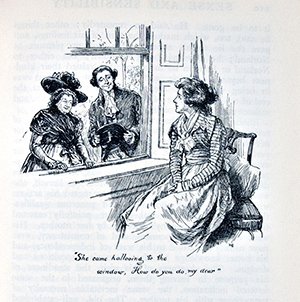
Every society story needs a gossip.
Miss Bates: Oh dear me, I do apologize that I do at times have a weakness for the diversions and delights brought by talk of the neighbors' to-dos and things, but I assure you, it's all of innocent intent. You see, "gossip" is, after all, such a negative word and—
Yours Truly: My dear Miss Bates, I wasn't talking about you. We're talking about Mrs. Jennings from Sense and Sensibility.
Miss Bates: Goodness, but that is a relief. One doesn't like to disappoint one's friends, you see. Yes indeed, I do declare that Mrs. Jennings has a tendency to insert herself into the romantic endeavors of our young brothers and sisters, does she not? Still, I'm sure it's with nothing but the best intentions . . .
Yours Truly: But of course, Miss Bates.
Nosy and lacking in self-control but with a kind heart, Mrs. Jennings is not weighed down by such things as tact and sensitivity when revealing her slightly crude, teasing humor. Though she does tend to poke and pry in the wrong places, Mrs. Jennings stands by her friends and family when it's truly important—and she still maintains her humor! Perhaps the best proof of Mrs. Jennings's hilarity is Austen's own description of her in Chapter 7:
Mrs. Jennings, Lady Middleton's mother, was a good-humoured, merry, fat, elderly woman, who talked a great deal, seemed very happy, and rather vulgar. She was full of jokes and laughter, and before dinner was over had said many witty things on the subject of lovers and husbands; hoped they had not left their hearts behind them in Sussex, and pretended to see them blush whether they did or not.
2. Mr. Collins—Pride and Prejudice
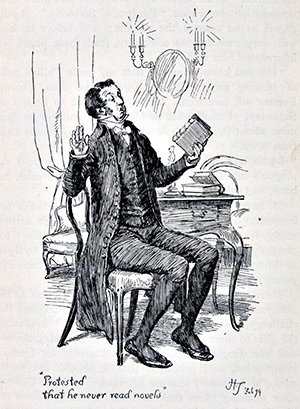 Miss Bates: Now, my dear, I do not like to speak ill of anyone. It is most unbecoming, you see, and I do believe every creature has a redeeming quality or two. But I must admit that Mr. Collins is of a most disagreeable sort.
Miss Bates: Now, my dear, I do not like to speak ill of anyone. It is most unbecoming, you see, and I do believe every creature has a redeeming quality or two. But I must admit that Mr. Collins is of a most disagreeable sort.
Yours Truly: I have to agree, Miss Bates. He's a pompous little weasel; if his ridiculousness didn't make me laugh so much, I'd absolutely hate him.
Miss Bates: Of course, I'm of a simple mind. Perhaps I'm just not of the intelligence to appreciate his long-winded sermons. Oh dear, that was terribly cruel of me, wasn't it? Here is your cake—oh! Napkin, sorry.
The truth is, Mr. Collins is the character we love to hate. He's pretentious but ridiculous. His simpering refusal to accept that he might be an undesirable husband never fails to elicit a chuckle, and his conduct at the Bennets' dinner table is laugh-out-loud hilarious. My favorite exchange?
"You judge very properly," said Mr. Bennet, "and it is happy for you that you possess the talent of flattering with delicacy. May I ask whether these pleasing attentions proceed from the impulse of the moment, or are the result of previous study?"
"They arise chiefly from what is passing at the time, and though I sometimes amuse myself with suggesting and arranging such little elegant compliments as may be adapted to ordinary occasions, I always wish to give them as unstudied an air as possible."
Miss Bates: Poor Mr. Collins. Not natural at all, I'm afraid.
Yours Truly: Not in the least. If you want to laugh even harder, watch this amazing adaptation of Mr. Collins's character in the Bollywood version of Austen's novel, Bride and Prejudice.
3. Isabella Thorpe—Northanger Abbey
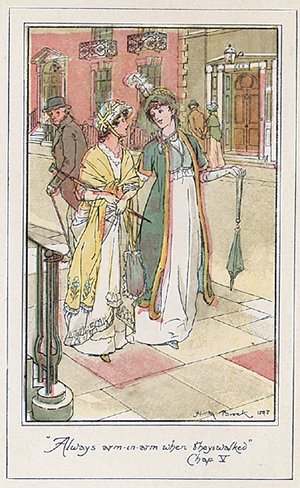 Miss Bates: Now, I must tell you, I heard the most dreadful thing about Miss Thorpe. She's been dropped by that knave, Captain Tilney, and now wants poor Mr. Morland back. Quite the scandal! But of course, I'm sure she is a lovely girl. Such a shame, truly, that she does default to such wild behavior!
Miss Bates: Now, I must tell you, I heard the most dreadful thing about Miss Thorpe. She's been dropped by that knave, Captain Tilney, and now wants poor Mr. Morland back. Quite the scandal! But of course, I'm sure she is a lovely girl. Such a shame, truly, that she does default to such wild behavior!
Yours Truly: Indeed, but what's an Austen novel without a society scandal?
Miss Bates: Now, my dear, you mustn't encourage such things, even if it does make for rather exciting talk at teatime. Would you care for a cucumber sandwich? I should have offered them before the cake . . .
Isabella Thorpe is easily the most entertaining character in Northanger Abbey. Scheming, unpredictable, and terribly funny, her manipulative tactics are both infuriating and fantastic. Austen's novels are full of silly, amusing caricatures that are fun to chuckle at, but Isabella is a cut above the rest. Her humor is sharp, witty, and ferociously clever. Beautiful, cunning, and an expert at word games, Isabella is a force to be reckoned with. She talks circles around anyone and everyone, and her rapid-fire switches from serious topics to the superfluous are downright hilarious.
"He is the only man I ever did or could love, and I trust you will convince him of it. The spring fashions are partly down; and the hats the most frightful you can imagine."
4. Frank Churchill—Emma
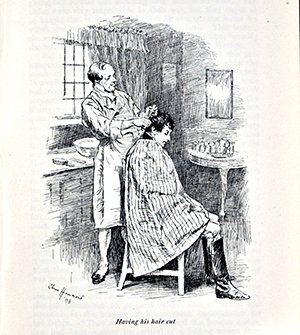 Miss Bates: I do believe my dear niece Jane Fairfax mentioned Mr. Frank Churchill in her last letter to me. She writes the most beautiful letters, my dear Jane, with the most elegant penmanship, don't you agree?
Miss Bates: I do believe my dear niece Jane Fairfax mentioned Mr. Frank Churchill in her last letter to me. She writes the most beautiful letters, my dear Jane, with the most elegant penmanship, don't you agree?
Yours Truly: Just beautiful, yes. What did she say about Frank?
Miss Bates: Oh, now, I simply must find the letter, to read it as only Jane can put things, you see. Would you like some more tea? Just a moment . . .
Knowing Miss Bates and her particularities, this could take a while. I might as well tell you about Frank Churchill. Frank, to be, well, frank, is a sexy character. He's flirty and tempting in all the right ways. We know he's full of himself, and we can't quite trust him, but we enjoy his advances anyway. Most of Frank's attractiveness comes from his way with words. The man is witty, and he knows it. Frank mirrors Emma's cleverness (sometimes at the expense of others). He's funny because he knows it will charm the pantaloons (or petticoats) off anyone. Truly, Frank is the son of privilege. He'll travel a whole day to get a haircut and speaks at parties because, well, he just loves to hear himself sound clever. I'm particularly fond of Emma's disillusioned description of him here:
Emma's very good opinion of Frank Churchill was a little shaken the following day, by hearing that he was gone off to London, merely to have his hair cut. A sudden freak seemed to have seized him at breakfast, and he had sent for a chaise and set off, intending to return to dinner, but with no more important view that appeared than having his hair cut. There was certainly no harm in his travelling sixteen miles twice over on such an errand; but there was an air of foppery and nonsense in it which she could not approve.
5. Mr. and Mrs. Bennet—Pride and Prejudice
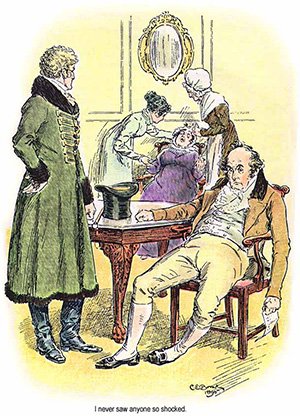 Miss Bates: Now, my dear, I do not like to point out fault in anyone. It's a terribly discourteous thing to do, you see, but I do believe Mr. and Mrs. Bennet are, in fact, two persons.
Miss Bates: Now, my dear, I do not like to point out fault in anyone. It's a terribly discourteous thing to do, you see, but I do believe Mr. and Mrs. Bennet are, in fact, two persons.
Yours Truly: I am aware, Miss Bates. The thing is, the two are just so funny when they're together that I couldn't help but include them both here.
Miss Bates: Oh yes, of course. How very clever of you! I dare say Mr. Bennet thinks quite highly of cleverness, though perhaps Mrs. Bennet is not so fond. I did hear tell—from her kitchen maid, you see, who helps me acquire fresh milk from time to time—that Mrs. Bennet has been known to crack a raw egg into her morning drink. Gossip is a terrible thing, naturally, but one cannot deny that a raw egg before noon is certain evidence of, shall we say, joyful inebriation, the night before?
Yours Truly: I can't say I'm an expert on how often Mrs. Bennet dips into the party punch, but I do know she and her husband make a hilarious pair.
Mrs. Bennet is the obvious comedic force. She's melodramatic, loud, and foolish. She is a frantic busybody in a perpetual state of (loudly) self-declared victimhood. In contrast, Mr. Bennet's intelligent sarcasm is second only to his patience. He is the master of the backhanded compliment (see Mr. Collins's example above) and is known to insert perfectly timed dry observations into his wife's hysterical outbursts. The juxtaposition of the two is comedic genius—a shrill, overbearing mother who never catches on to her husband's use of irony and an aging man playing the role of bemused spectator, when really the poor soul is probably quite tired.
"Mr. Bennet, how can you abuse your own children in such a way? You take delight in vexing me. You have no compassion for my poor nerves."
"You mistake me, my dear. I have a high respect for your nerves. They are my old friends. I have heard you mention them with consideration these last twenty years at least."
6. Mr. and Mrs. Palmer—Sense and Sensibility
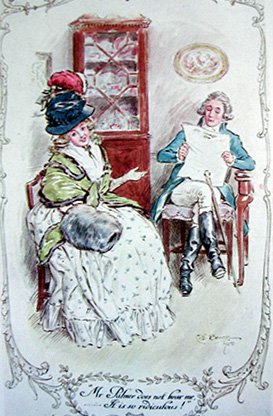
Miss Bates: Another couple? Goodness, shall I put on another pot of tea?
Yours Truly: I don't think they'll be coming today, Miss Bates. Mr. Palmer is not very sociable.
Miss Bates: Oh, but company is always so lovely. I could read them Jane's charming letter. Did I ever find it? Dear me, let me see.
Though in a different book, Mr. and Mrs. Palmer's relationship is similar to that of the Bennets. Mrs. Palmer is young, silly, and rather frivolous. Her husband is grim and of an ill humor (though he later reveals his endearment to his family). Together, the two add mirth to scenes that might be heavy with emotional drama otherwise. While Mrs. Palmer constantly laughs, gossips, and shrieks, her husband buries his nose in his newspaper and gleans his only scrap of enjoyment from sarcastically contradicting his wife. While I can't say this is the healthiest relationship Austen has crafted, it does have entertainment value.
"My love, you contradict everybody," said his wife, with her usual laugh. "Do you know that you are quite rude?"
"I did not know that I contradicted anybody in calling your mother ill-bred."
7. Mr. Woodhouse—Emma
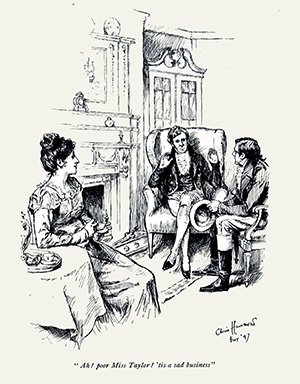
Yours Truly: Austen does love her amusing old father figures, doesn't she?
Miss Bates: Oh, but Mr. Woodhouse is absolutely the most sophisticated of gentlemen, second only to perhaps our dear Mr. Knightly. I dare say I agree with his concerns about catching cold on leaving the house in any capacity.
Yours Truly: Yes, but doesn't he get just a bit ridiculous? He thinks absolutely everything will make him ill, from parties at Christmas to exposure to babies to cake served at weddings.
Miss Bates: My dear, when you are of such a distinguished age, to go out with one's neck exposed even in the summertime is really quite troubling. Though, if you please, don't tell Mr. Woodhouse that I served you cake.
Mr. Woodhouse is lovable but overbearing and fearful to the point of agonizing. He's like your Aunt Gertrude, who always made you wear a sweater, even in the middle of July. His woeful protestations to the slightest disruption of his daily routine (for example, when Emma's governess is so unkind as to go off and get married) make us laugh, but we also say a small prayer of thanks that we didn't have to grow up in his house. In a novel about love games, Mr. Woodhouse tries avidly to convince people not to marry because of how it disrupts one's social circles. If that's not enough, he's also a chronic hypochondriac in a world full of social gatherings (even, gasp, in WINTER!). Mr. Woodhouse delivers his comedic best when he assumes that everyone around him is just as obsessed with health—down to the smallest crumb of detail—as he is.
"I would not recommend an egg boiled by any body else; but you need not be afraid, they are very small, you see—one of our small eggs will not hurt you. Miss Bates, let Emma help you to a little bit of tart—a very little bit. Ours are all apple-tarts. You need not be afraid of unwholesome preserves here. I do not advise the custard."
And my personal favorite, his grave warning when Harriet is so reckless as to sit in the garden to have her portrait painted:
"It is never safe to sit out of doors, my dear."
Bonus: Lady Bertram's pug—Mansfield Park
 Maybe it's just me, but I find the image of Lady Bertram obsessing over her pug absolutely hilarious. I picture him perpetually on a purple satin pillow. In other words, he's basically Percy, Governor Ratcliffe's dog in Pocahontas.
Maybe it's just me, but I find the image of Lady Bertram obsessing over her pug absolutely hilarious. I picture him perpetually on a purple satin pillow. In other words, he's basically Percy, Governor Ratcliffe's dog in Pocahontas.
Miss Bates: Oh, I quite agree, my dear. Pugs are really the most preposterous little things. Never a fine-bred creature had quite so squashed a nose. More cake?
Now, I know you didn't read half of this post, because you were just too jealous of my charming tea and cake party with Miss Bates. I can't blame you—she's pretty wonderful. So is the cake. And these needlepoint napkins are adorable. If you're feeling left out, watch the 1996 film adaptation of Emma. Afterward, Miss Bates and I courteously invite you to comment on Scribendi's Facebook or Twitter page with your opinion on who takes the cake (ha-ha!) for funniest Jane Austen character.
Image sources: iFrank/Pixabay.com, monneygrabbing/Pixabay.com, all Jane Austen illustrations licensed under Public Domain via Wikimedia Commons





